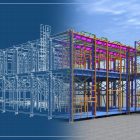The term Digital Transformation generally identifies actions aimed at important technological changes within production and non production systems. However, this definition now known as the most common, appears to describe only one specific aspect of the entire model, that is the technological one. In fact, other aspects distinguish Digital Transformation and, among these cultural, managerial social and organizational changes can certainly be mentioned. In general, any type of change that is associated with the application of the potential of digital technology within society falls within the concept of Digital Transformation.
Digital Transformation, therefore, is characterized by the presence of enabling elements of a multidisciplinary type which brings together the presence of modern technologies for the provision of services and for the supply of goods.
The goal of Digital Transformation is to obtain services and products characterized by an increase in quality standards thanks to the support of digital technologies.
Digital Transformation processes are not limited to the use of modern digital technologies but lead to the involvement of the entire system involved in these processes guaranteeing a high increase in sharing and transparency levels.
Digital Transformation, thanks to the involvement of the entire system, defines a new approach in the generation of value. In fact, the receiver of the product or service is not a mere passive figure in the process but becomes an integral part of it.


